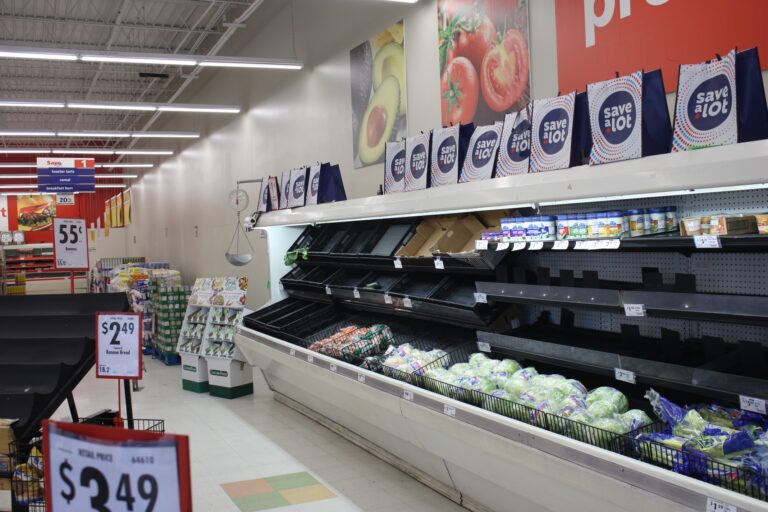Sam Judy's story
Contributed by Marlissa Collier
South Dallas' food insecurity problem is about to get worse.
In a press release last Monday, Urban Harvest Foods and Shekinah Legacy Holdings announced that Moran Foods LLC has ended partnership negotiations and will close MLK Save-A-Lot stores on February 16th. Decided. The store has been a neighborhood staple for affordable groceries for more than 20 years, but its operations have been unstable since Moran closed it in 2020. We have decided to move to a wholesale business model. The employees were reportedly told by Moran Foods that “the landlord wants them to leave” even though the operator voluntarily vacated the premises.
Nicky, who lives in South Dallas, said of the closure, “The store wasn't doing very well, but it was an option.” “Now, you go down the street and Fiesta prices have doubled, tripled. Where do I get food? The closest other store is in Pleasant Grove.”

Scotty Smith of Shekinah Legacy Holdings was quick to voice opposition, saying previous deals with Moran Foods suggest the store has more time to prove its viability. .
“Moran Foods' sudden announcement of its closure is a blow to South Dallas,” Smith said in a press release about the decision. “For six months, we have been in active negotiations to take over the operations of the store, with the aim of ensuring continued essential food supplies in the region.[…] The sudden decision to close, ignoring community-based solutions, shows a blatant disregard for the well-being of south Dallas residents. ”
Scottie Smith, Founder of Shekinah Holdings
Prior to negotiations with Mr. Smith, Moran Foods had established standard contractual arrangements with independent owner Yellow Banana LLC. Yellow Banana LLC. is based in Washington, D.C. and is focused on providing access to low-cost groceries in food deserts across the country. Moran Foods ended the partnership after Yellow Banana reportedly did not meet its contractual obligations in operating its stores, and residents and employees claimed that the product was extremely low in stock.
Despite an earlier promise of a phased closure, Moran Foods has now suspended its grocery store operations at the building on Martin Luther King Jr. Boulevard. February 16th.

“In other words, [if the economy] If the situation continues to worsen, the city has to do something, right? ” said Darian, a South Dallas local. “People can't survive without food, and having one grocery store in this area doesn't do that.”
Yellow Banana's handling of MLK Save-A-Lot was just another failure in the LLC's already lackluster track record of providing viable options for inner-city residents, but it also highlighted the company's sloppy management. contributed to the growing economic ruin of the place. Now, as the company prepares to permanently close, residents are forced to rely on Fair Park's Fiesta Food Mart as the area's only low-cost grocery store.
Residents are asking the city to provide more food options in the area. However, as Ward 7 Councilman Adam Bazaldua's office previously stated, commissioning additional grocery stores would be “based on local income levels and store viability.”
Food pantries have similarly become less common in South Dallas, with operations steadily declining since 2020.
Like all low-income Texans, poor residents living in areas like South Dallas pay higher taxes than higher-income Texans. Sales tax has been found to be the most regressive tax system, with a higher proportion of small incomes, leaving South Dallas residents with proportionately less access to adequate financial resources. You will pay more taxes.
Food insecurity has been prevalent in South Dallas for years, but the city has not succeeded in significantly improving options in the area. As we interviewed the city of Dallas last year when we covered this issue, the city is not considering areas for grocery stores unless it can prove the investment is economically viable. But efforts are being made to make groceries more accessible farther south, near Redbird and Cedarcrest.

South Dallas/Fair Park's employed population accounts for more than 22,000 people in Dallas' workforce. Thirty-five percent of workers across southern Dallas County work in the blue-collar sector, and another 28.7% work in industries that work with the general public, such as the education, health care, and social sectors.
Additionally, South Dallas/Fair Park is home to approximately 8,000 children, raising concerns about the poor eating habits of students in the area. Adults also worry about young people in their neighborhoods becoming disillusioned with their standard of living.
“The high school students across the street come to me asking for work… As a member of this community and as a manager of a South Dallas business, I try to play a positive role. Currently, this business is closed and It's not very useful for children.”
Eric Patt, Save-A-Lot Manager at MLK
While the disappearance of a local Save-A-Lot store is a blow to the community, the MLK store's poor performance last year has already brought the first bittersweet feelings of closure. Increasing food insecurity in South Dallas is directly correlated with a variety of other statistics, including lower educational attainment and poorer health outcomes.
The average income of South Dallas residents is among the lowest in the city, and unless the city provides greater support, food and housing infrastructure will continue to collapse.


